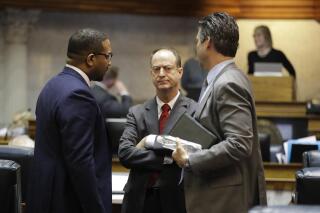Indiana Senate backs narrower bill on vaccine limitations

FILE - State Sen. Mark Messmer, center, R-Jasper, talks with Sen. Eddie Melton, left, D-Gary, and Sen. Ryan Mishler, R-Bremen, following a session at the Statehouse, Tuesday, April 23, 2019, in Indianapolis. An Indiana Senate panel on Wednesday, Feb. 16, 2022, endorsed rolling back a proposal that aimed to severely limit workplace COVID-19 vaccine requirements, setting up weeks of negotiations with House members on how far the Republican-dominated Legislature will go toward inserting itself on the issue. (AP Photo/Darron Cummings File)
INDIANAPOLIS (AP) — The Indiana Senate has endorsed a bill allowing administrative steps sought by Gov. Eric Holcomb that could result in the nearly two-year-old statewide COVID-19 public health emergency declaration ending later this week.
Senators voted 32-18 on Tuesday in favor of the proposal that doesn’t include provisions pushed by Republican House members that would force businesses to give requested religious exemptions from COVID-19 vaccine requirements “without further inquiry.”
Holcomb and Senate GOP leaders have sided with major business groups opposing the broad limitations backed by House members as wrongly interfering in business decisions.
The Senate version would require businesses to grant medical vaccine exemptions to workers along with religious exemptions as required by federal law and mandate that employers accept as a vaccine exemption a worker’s medical test results showing some level of “natural immunity” through a previous infection. Employees could be required to undergo COVID-19 tests up to twice a week.
Holcomb has sought legal changes that would enable the state to keep receiving about $40 million a month in enhanced federal funding for Medicaid and for about 200,000 households to continue receiving an additional $95 a month in federal food assistance. Another step would let the state health commissioner continuing issuing a standing doctor’s order for the administration of COVID-19 vaccinations to children ages 5 to 11.
The House and Senate must still agree on a single version of the proposal before it could go to Holcomb for his consideration.
Republican House Speaker Todd Huston, however, said last week that “you can count on it” when asked whether lawmakers would approve a bill addressing the emergency declaration before the current order’s Friday expiration.
An attempt by House Republicans to fast-track employer vaccination limits into law failed in November amid conservative uproar over President Joe Biden’s proposed mandate that would have required large employers to have their workers be vaccinated or tested weekly for COVID-19. Federal courts blocked Biden’s proposal.
Holcomb has since issued three monthlong renewals of the emergency declaration and he said last week he would do so again if legislative approval isn’t completed before expiration of the current order.
Senate Majority Leader Mark Messmer of Jasper said the Senate’s version would protect decision making by businesses while putting into law steps for workers such as recognizing natural immunity that aren’t in federal law.
“What’s lacking without this bill is any level of protection for employees,” Messmer said. “Without this bill, employees have nothing to stand on.”
Republican Sen. Chip Perfect of Lawrenceburg, however, argued that the proposal was “rearview mirror legislating” as it was responding to the blocked Biden vaccine mandates.
“We were dramatically opposed to the federal government imposing mandates upon our employers and employees, and our response to that is to impose a mandate on our employers,” Perfect said. “It’s completely illogical. I don’t find the rationality in it.”
Democratic senators objected to a bill provision that would cut off Indiana’s participation in the enhanced federal funding for food assistance as of April 16, which is when the current federal COVID-19 health emergency expires. Republicans argue that the extra money was no longer needed with low unemployment levels in the state.
“We’re getting closer to when the government, I’m sure, will declare the public health emergency is over but we are not there yet,” said Democratic Sen. Jean Breaux of Indianapolis. “Until we go there, families still need our help and it cost us nothing to provide families with the additional assistance.”
